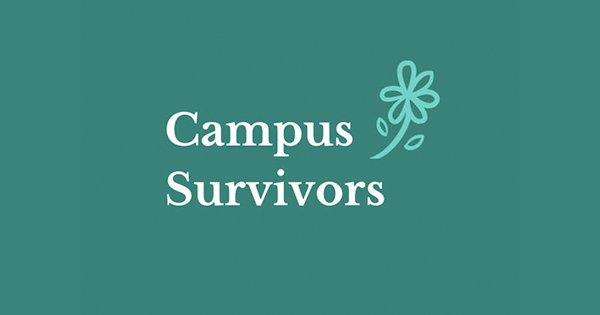New Instagram Page Gives Survivors of Sexual Assault a Safe Place to Share Their Stories
New Instagram Page Gives Survivors of Sexual Assault a Safe Place to Share Their Stories
Campus Survivors, launched by BU students, seeks to erase stigma around reporting and to offer support
For many reasons, people who have experienced sexual abuse are less likely to come forward than victims of other crimes. Two of the most daunting, victims and experts say, are the fears of stigma and not being believed.
Campus Survivors is a new, independent organization launched this spring by four BU students that seeks to create a supportive community for survivors of sexual assault by inviting them to share their stories, which are posted to the group’s Instagram page. The group welcomes submissions from students on other college campuses as well and already has close to 1,500 followers.

Founders Prisha Sujin Kumar (CAS’22), Sophia Kim (CAS’23), Lily Stone (CAS’21), and Yashica Kataria (CAS’23) say the goal of their page is to erase the stigma that some survivors feel in talking about their sexual assault. “It’s important for sexual assault survivors to have a safe place to share their story, because it can feel pretty freeing, says Sujin Kumar. “It lets them see that they are not alone.”
The account invites followers to anonymously tell their stories, either through a Google submissions form or through a direct message to the account. The group shares a list of resources, including organizations that can offer assistance and guidance on how to report the crime.
The team came together a few months back after the BU Gigs Instagram account—best known for its lists of items for sale and apartments for rent—put out a call asking Terriers who had experienced some kind of discrimination while in college to tell their stories. They received posts from numerous survivors of sexual assault and realized their Instagram page wasn’t the best place to address those stories. So they asked their users if anyone was interested in setting up a separate account devoted to sexual assault stories.
Sujin Kumar, Kim, Stone, and Kataria, who did not yet know one another, responded and soon joined to form Campus Survivors. They started drawing submissions by word of mouth and began to include stories from survivors at other schools, including Northeastern and Stoneybrook.
In one post, a survivor wrote of being sexually assaulted as a high school student by an ex-boyfriend while they were at a party. The victim, then underage, was initially afraid to report the assault, since it took place at a party. Once they did go public, they said, friends and school administrators attempted to dismiss the account, chalking it up to a misunderstanding. The survivor said they are still deeply affected by what happened to them, and disheartened at the lack of compassion they received after the assault. “The victim-blaming culture is absolutely disgusting,” they wrote in their post. “I hope that by [telling] these stories, it can eventually change because no one deserves to be treated like that.”
Other posts include accounts of sexual assaults taking place while the victim was incapacitated after drinking, or being sexually harassed in a GroupMe forum or at fraternity parties.
According to last year’s Campus Climate Survey of Sexual Assault and Misconduct, one-third of BU students said they experienced some level of sexual harassment in school, and one-third of undergraduate women reported some type of nonconsensual sexual contact. More than 20 percent of BU undergraduate women were victims of incidents involving physical force or the inability to consent or stop what was happening.
Maureen Mahoney, director of BU’s Sexual Assault Response & Prevention Center (SARP), and Nathan Brewer, a SARP crisis intervention counselor who will be taking over as director next month when Mahoney retires, issued a joint statement applauding the group and its work. “The Campus Survivors Instagram has provided space for sexual assault survivors to speak their truth, something that is important for many survivors’ healing,” they say. “Student activism was instrumental in creating SARP, and we hope that the current activism prompts some institutional self-reflection, resulting in changes in the processes and responses that retraumatize survivors who turn to the University for assistance.”
Mahoney and Brewer say one of Campus Survivors’ greatest strengths is that it illustrates the many ways sexual violence can present. The survivor stories show that it can happen in the context of ongoing romantic relationships, that coercion is often the weapon of choice, and that men also experience sexual assault. “These stories point to the ongoing challenge of rape culture, where too often survivors are not heard, believed, or supported in the way they deserve,” say Mahoney and Brewer.
Sujin Kumar is a survivor of sexual assault herself. In an open letter posted on her Instagram and Medium pages, she describes being assaulted last year and recounts her subsequent experience reporting it to University administrators. While she credits SARP and Student Health Services for their help, she criticizes other University entities for the way she says they brushed her comments aside. Worst of all, she says, her assaulter will be back on campus soon after a yearlong suspension. Her post received more than 6,600 likes on Instagram and messages of support.
Campus Survivors cofounder Kataria says their organization works hard to support and validate survivors. “A lot of times survivors feel like no one believes them, and so we work to form a community in which they feel believed, supported, and accepted,” she says. “People leave comments on submissions saying, ‘I believe you, I support you’—just kind words of support and encouragement.”

Comments & Discussion
Boston University moderates comments to facilitate an informed, substantive, civil conversation. Abusive, profane, self-promotional, misleading, incoherent or off-topic comments will be rejected. Moderators are staffed during regular business hours (EST) and can only accept comments written in English. Statistics or facts must include a citation or a link to the citation.